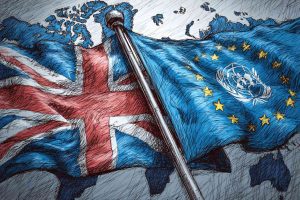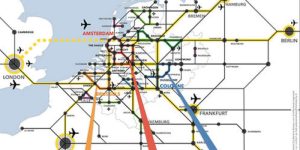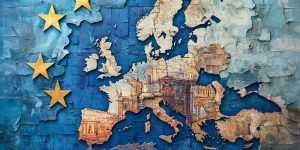D66 and the dismantling of the Netherlands: how international idealism undermines national democracy

Origins and ideological course
Democrats 66 (D66) was founded in 1966 by Hans van Mierlo with the goal of political renewal and strengthening democracy in the Netherlands (De geschiedenis van D66, Hans van Mierlo). The party initially aimed to break the pillarized system, increase citizen participation, and create a more modern parliamentary system. Early on, however, it became clear that their policies had a strong international and European focus (Het Europa van D66, Jan Marijnissen).
Although D66 presents itself as progressive and modernizing, their choices and policy proposals reveal a consistent pattern: European and international interests often take precedence over national sovereignty and the direct influence of Dutch citizens.
European integration and the shift of power
Since its founding, D66 has been an outspoken supporter of European integration. The party supported institutional reforms such as the Lisbon Treaty, strengthening European legislation, and expanding the powers of supranational institutions (Het EU-dilemma in Nederland, Kees van der Pijl).
As a result, more and more policy decisions come from Brussels rather than The Hague. Matters that directly affect the Dutch economy, legislation, and migration are increasingly determined at the EU level. Critics argue that D66 systematically undermines national control, while presenting this as modernization and internationalization (Lissabon en de democratische kloof, NRC).
The focus on European cooperation has also led to a reluctance to expand national referenda and citizen participation. Decisions that used to be influenced through national instruments are now increasingly made at the supranational level.
The referendum and limitation of citizen participation
Historically, D66 advocated for more direct democracy, with an emphasis on referenda. In practice, however, the party played a role in abolishing the advisory referendum in 2018 (Het einde van het raadgevend referendum, De Groene Amsterdammer).
As a result, citizens lost significant influence over major policy choices, such as European treaties and important national legislation. Critics see a pattern here: D66 promotes democratic ideals but subordinated them to the broader agenda of European cooperation and technocratic policymaking (Democratie in Nederland en de rol van D66, Jos van der Lans).
By abolishing the referendum, the party not only limits direct democracy but also strengthens the position of Brussels and national elites over ordinary citizens.
Migration policy and international obligations
D66 pursues a migration policy strongly focused on international norms and humanitarian obligations (Immigratie en integratiebeleid in Nederland, Pieter Omtzigt). The party promotes generous admission of asylum seekers and labor migrants, emphasizing European cooperation and solidarity.
While this policy can be considered humanitarian, it creates tensions with national capacity, social cohesion, and public opinion. Citizens experience that decisions on migration and integration align less with their preferences, while D66 continues to prioritize these choices. Critics emphasize that this policy clearly prioritizes international over national interests (Het debat over migratie en democratie, Elsevier Weekblad).
D66 also advocates strengthening international cooperation in migration, binding the Netherlands to EU-wide arrangements that do not always align with national needs or public support.
Education and cultural orientation
D66 invests heavily in education and cultural modernization, emphasizing international cooperation, innovation, and globalization (Onderwijs en vooruitgang, Hans van Mierlo). The policy targets the education of a globally oriented, highly educated class.
Critics note that traditional Dutch values and local cultural identity receive less attention (De rol van educatie in politieke vernieuwing, NRC). This reinforces the perception that D66’s policy choices are more aimed at international elites than the wider Dutch population.
By linking education and culture primarily to international standards and technocratic principles, the focus shifts away from national identity and citizen participation.
Technocracy and administrative reform
D66 promotes administrative reforms and technocratic decision-making, including a smaller House of Representatives, strengthening professional governance, and greater influence for policy experts (Bestuurlijke modernisering in Nederland, De Volkskrant).
This leads to decisions increasingly made by experts and European institutions, rather than elected representatives or direct democracy. The result is a shift of power away from citizens, reducing the direct influence of Dutch people on policy.
Critics see a consistent pattern: D66 appears to prioritize international norms and technocratic efficiency over national sovereignty and citizen participation.
Climate policy and European direction
D66 is known for ambitious climate goals and energy transition plans, often aligned with European directives and international climate agreements (Energie en beleid in Nederland, NRC).
While these goals are presented internationally as progressive, they have direct consequences for national energy security, economic costs, and citizen burdens. By strongly promoting European climate standards, D66 relinquishes national policy space, making the Netherlands bound to international priorities that do not always align with domestic needs.
Coalition formation and influence in cabinets
D66 pursues a strategy of maximizing influence through coalition participation, even as a small party (Coalitiepolitiek en D66, Pieter Omtzigt). This allows them to advance their European and international agenda, even when it is not widely supported by the population.
Through this strategy, D66 increases its policy impact, but it also reinforces the perception that the party prioritizes European and international goals over national interests. Decisions on legislation, migration, and education increasingly depend on coalition compromises centered on European and international priorities.
Structural impact on national interests
Across policy domains, including EU integration, migration, education, technocracy, climate, and coalition strategy, D66 consistently places international and European agendas above national interests.
The abolition of the referendum, emphasis on EU decision-making, migration policies, and technocratic reforms limit the influence of Dutch citizens and reduce national sovereignty (Het einde van het raadgevend referendum, De Groene Amsterdammer; Democratie in Nederland en de rol van D66, Jos van der Lans).
This trajectory shows that D66 policies systematically pressure national autonomy and increase the power of European and international institutions at the expense of direct democratic control.
Critical conclusion
D66 combines ideals of democratic renewal with a clear European and international orientation. Their policies show that national interests and direct citizen participation are often subordinated to supranational priorities.
Decisions on legislation, migration, education, administration, and climate are increasingly influenced by European standards and technocratic expertise. As a result, citizen power and national sovereignty diminish, while European and international agendas dominate.
The pattern is clear: D66’s course strengthens European and international influence at the expense of national autonomy and direct democracy, leaving Dutch citizens with less control over decisions that directly affect their lives. D66’s policies demonstrate that their priorities are structurally aimed at international and European interests, rather than the direct protection of national interests.


















